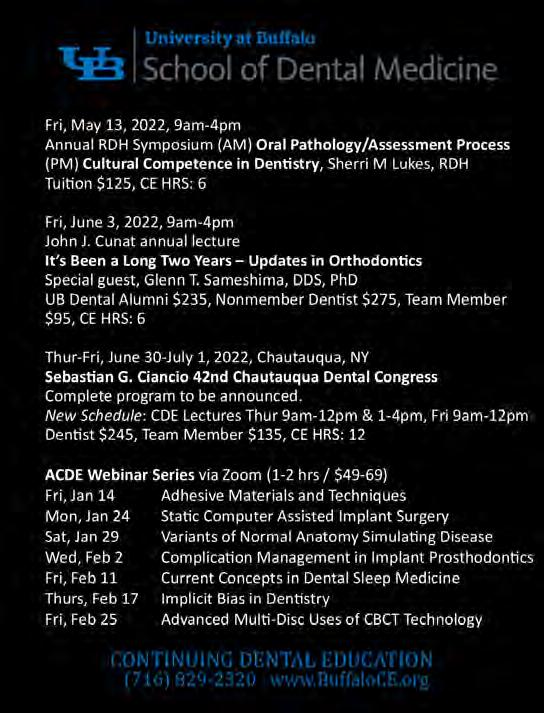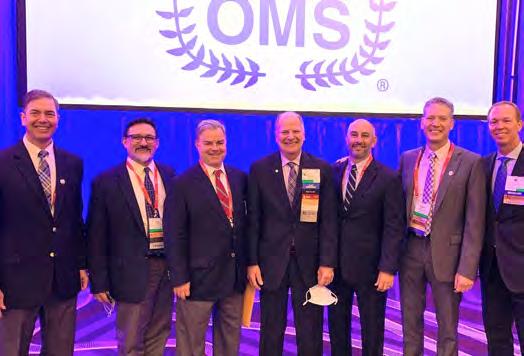
3 minute read
General News
Veterans Benefit from Free Care
THE STEPHEN B. GOLD DENTAL CLINIC at St. Charles Hospital in Port Jefferson, in what has become a tradition, hosted “Give Vets a Smile Day” on Nov. 3, an event devoted to offering veterans free dental services. The clinic credits the tireless efforts of the its coordinator, dental assistants, hygienists, residents and several local dentists who generously donated their time with its ability to treat 25 veterans and provide them with much-needed, extensive dental care.
A grant from the Mother Cabrini Foundation made it possible for St. Charles to host this event twice this year.

Veteran John Hansen was one of 25 veterans to receive free care at St. Charles Hospital in November. Administering care were resident TravisMackey, D.D.S, left, and hygienist James Caldroney, R.D.H.

Dr. Zambon to Retire as Dean of UB Dental School
JOSEPH J. ZAMBON, D.D.S., PH.D., SUNY Distinguished Teaching Professor of Periodontics and Endodontics and dean of the School of Dental Medicine, announced that he will retire from UB, effective Jan. 5.
A UB faculty member since 1982 and an internationally recognized authority on periodontal pathogens, Dr. Zambon was appointed dean of the School of Dental Medicine in 2016, after serving as interim dean for one year.
He led the school in creating and implementing a new strategic plan focused on growing research capacity; providing transformative educational opportunities; improving clinic operations; recruiting excellent and diverse faculty, staff and students; and enhancing the school’s visibility. Under his leadership, the school has significantly increased federal grant proposals and expenditures. And despite increasing competition for the very best students, the school has attracted the highest number of applicants in its history.
The success has earned the School of Dental Medicine recognition as one of the nation’s top dental schools, including being ranked No. 8 in the nation and No. 9 worldwide in the highly influential 2020 Annual Ranking of World Universities.
In the coming weeks, an interim dean of the School of Dental Medicine will be named as the university plans for a national search for the next dean.
Oral Surgeons Meet in Nashville

Officials from the New York State Society of Oral & Maxillofacial Surgeons (NYSSOMS) gather at the Annual Meeting of the AmericanAssociation of Oral & Maxillofacial Surgeons (AAOMS) in Nashville,TN, this fall. They are, from left, Glen Donnarumma, Edward Miller,Timothy Fallon, Victor Nannini, Joseph Fantuzzo, David Todd and TimothyKelling. Dr. Nannini completed his year as immediate past president ofAAOMS at the meeting.

NYSSOMS Executive Director Michael Herrmann, right, with plaque awarding him Honorary Fellowship in AAOMS. He is joined by AAOMS Immediate PastPresident Victor Nannini.
Heartburn Drugs may have Unexpected Benefits on Periodontal Disease
THE USE OF HEARTBURN MEDICATION is associated with decreased severity of periodontal disease, according to a recent University at Buffalo study.
The research found that patients who used proton pump inhibitors (PPIs) were more likely to have smaller probing depths in the gums.
The findings, published last month in Clinical and Experimental Dental Research, may be linked to the side effects of PPIs, which include changes in bone metabolism and in the gut microbiome, says lead investigator Lisa M. Yerke, D.D.S., clinical assistant professor in the Department of Periodontics and Endodontics at the UB School of Dental Medicine.
“PPIs could potentially be used in combination with other periodontal treatments; however, additional studies are needed to understand the underlying mechanisms behind the role PPIs play in reducing the severity of periodontitis,” Dr. Yerke says.
Additional investigators include first author and UB alumnus Bhavneet Chawla and Robert E. Cohen, D.D.S., Ph.D., professor of periodontics and endodontics in the UB School of Dental Medicine.
The study sought to determine whether a relationship exists between PPI use and periodontal disease. The researchers analyzed clinical data from more than 1,000 periodontitis patients either using or not using PPIs. Probing depths were used as an indicator of periodontitis severity.
Only 14% of teeth from patients who used PPIs had probing depths of 6 millimeters or more, compared to 24% of teeth from patients who did not use the medication. And 27% of teeth from patients using PPIs had probing depths of 5 millimeters or more, compared to 40% of teeth from non-PPI users, according to the study.
The researchers theorized that PPIs’ ability to alter bone metabolism or the gut microbiome, as well as potentially impact periodontal microorganisms, may help lessen the severity of gum disease.
Additional studies are under development to determine if this relationship can be found in other populations of patients with periodontal disease, and to learn to what extent the relationship can be directly attributed to PPIs, Dr. Yerke says.






